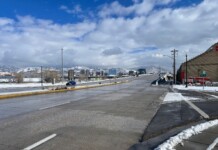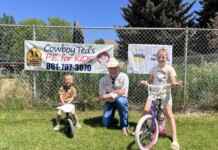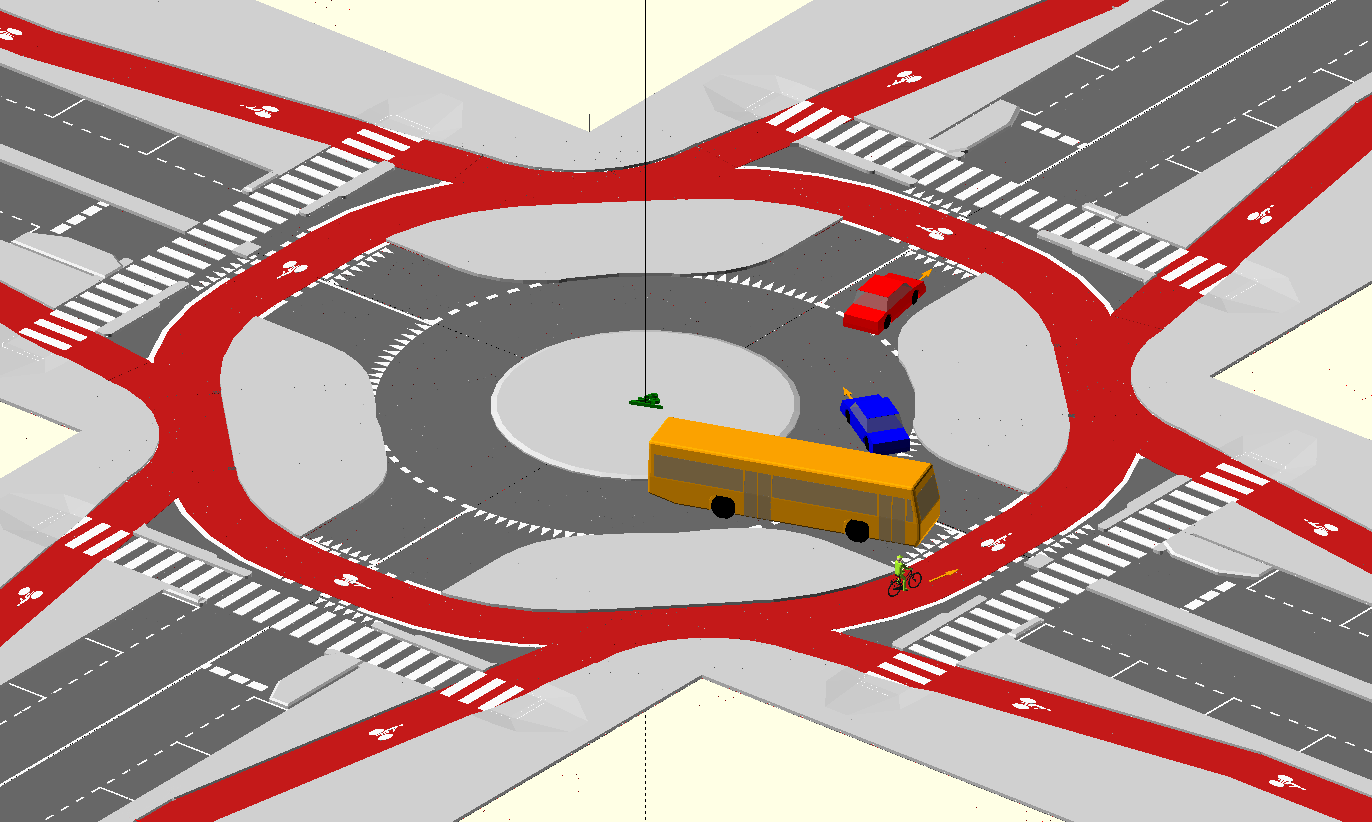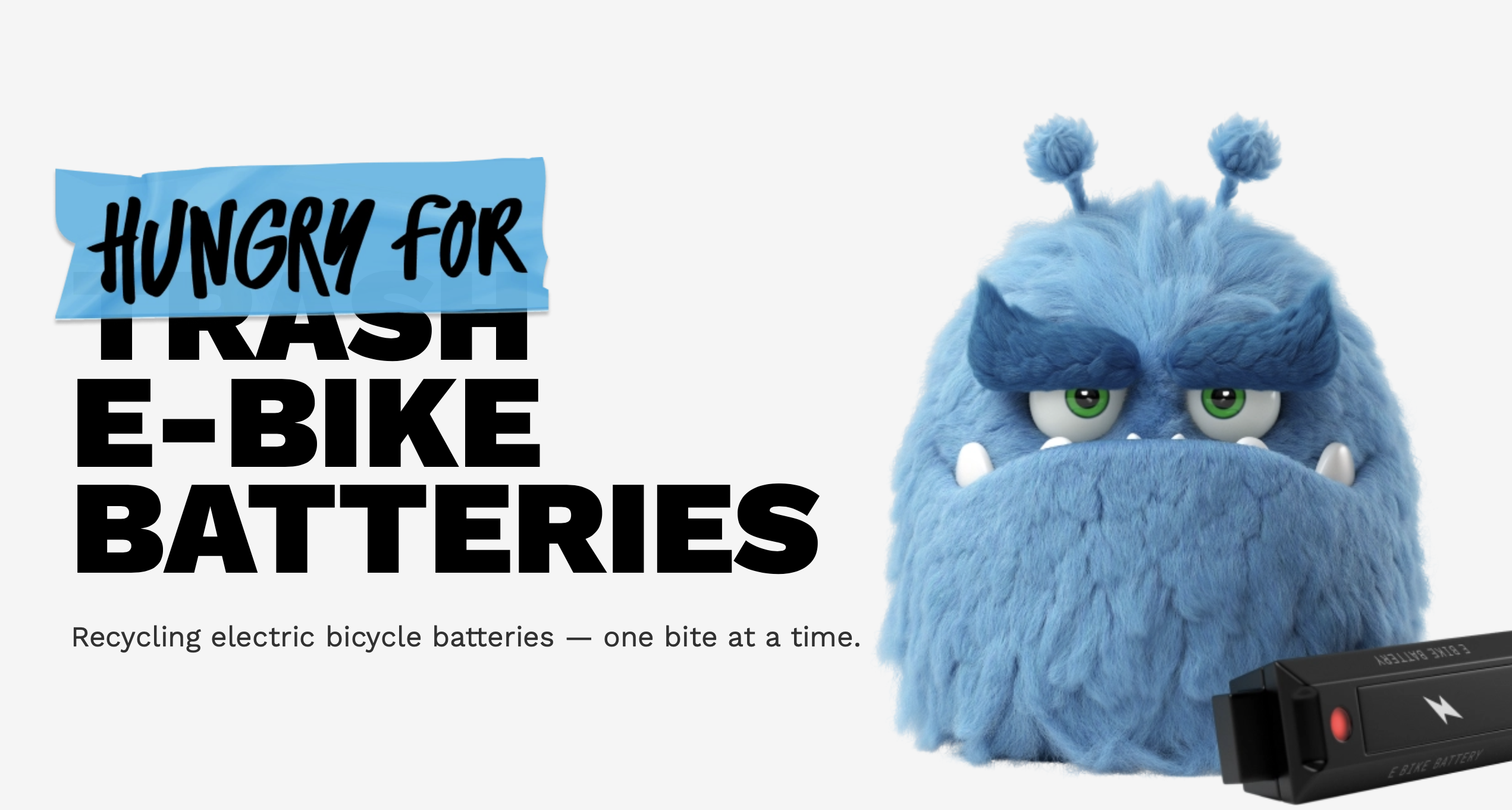By Lou Melini — It was March 13, 2020 when I received an email stating that due to concerns with the coronavirus the Bicycle Collective where I had been volunteering nearly 40 hours/month for over 3 years was shutting down.
In addition to the Collectives in St. George, Ogden, Provo and Salt Lake City, non-profit bike shops across the country closed their doors. In the region that Cycling West serves, Free Cycles in Missoula, and the Boise Bicycle Project also shut down.
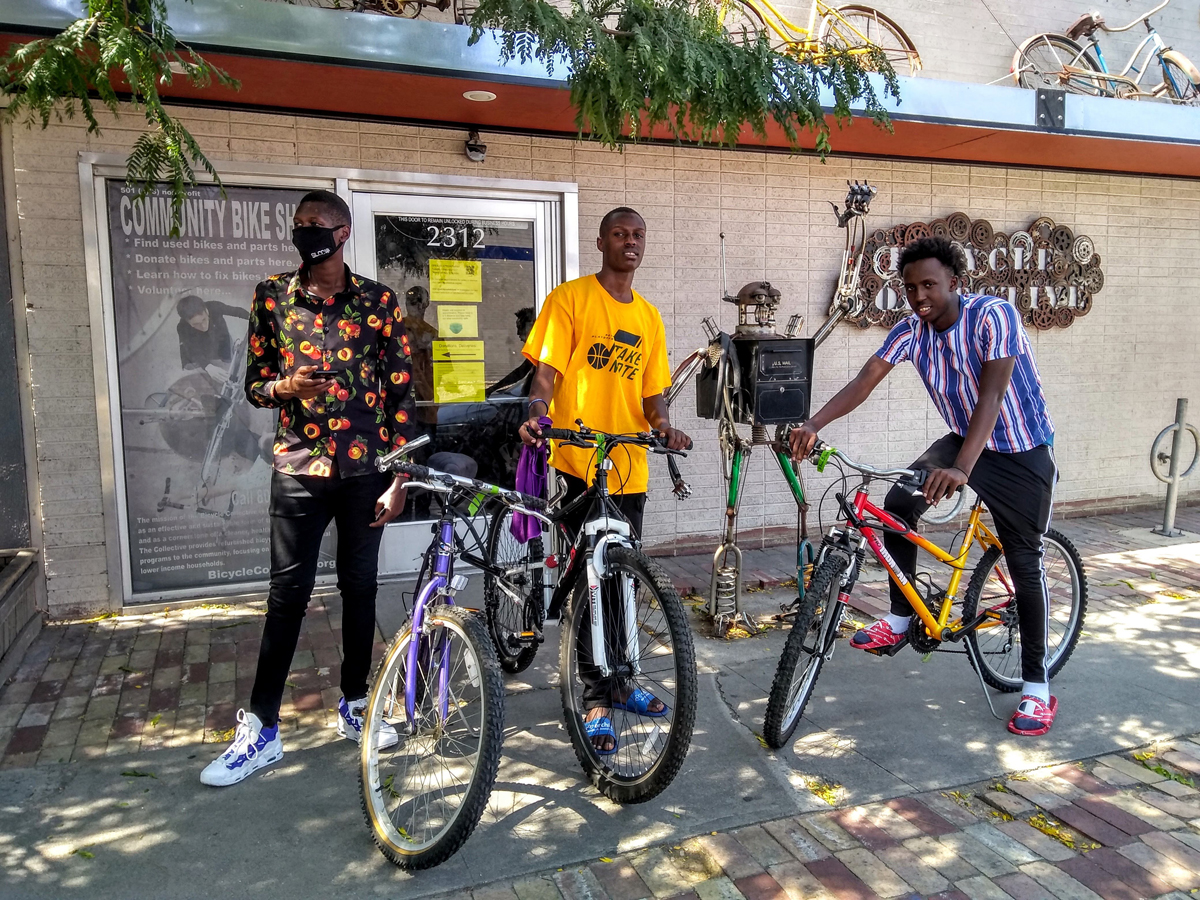
Unfortunately those most in need are usually most adversely affected by a crisis no matter the cause. With the coronavirus non-profit bicycle shops that assist the community with bicycle transportation have scrambled to meet the needs of their clients while maintaining an environment that is recommended by the CDC.
Within two weeks of shutting down, the Bicycle Collective reorganized, regrouped, and reinvented itself offering appointments for repairs and opening an on-line store while keeping employees on the payroll. Free Cycles reopened with an on-line bike store according to the website. The Boise Bicycle Project has also changed in order to provide services for the community it serves.
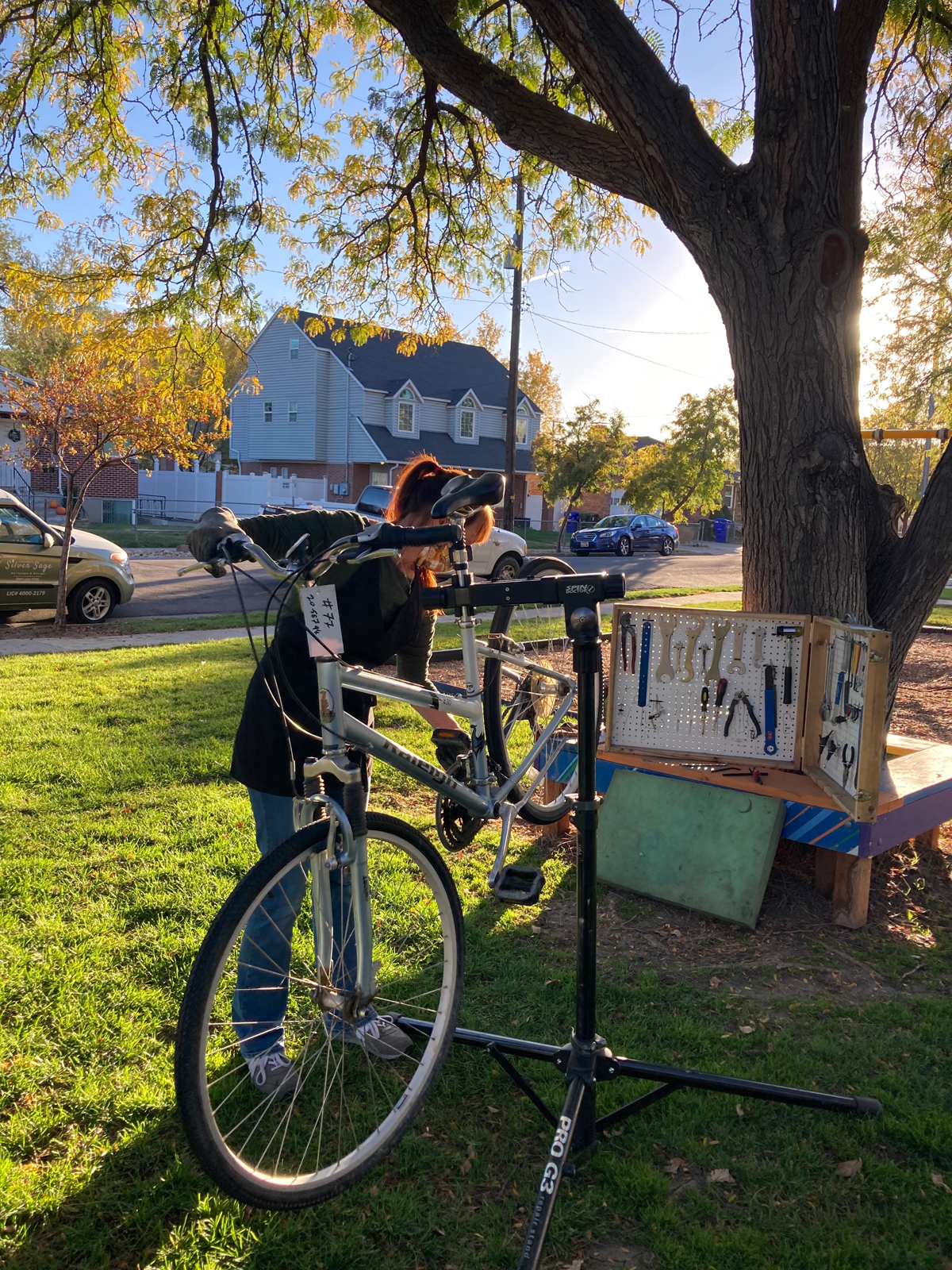
Essen Skabelund is the volunteer coordinator at the Salt Lake City location of the Bicycle Collective. She has been an integral part of creating and maintaining the volunteers’ schedules while juggling the requirements of social distancing.
Cycling West: Tell the readers about the effect of the pandemic.
Essen S.: We had an interesting spring and summer during the pandemic as our volunteer capacity was cut from around 20-30 volunteers per week in the shop to 0-7 volunteers outside of the shop per week! This was due to limited volunteer capacity to volunteer from home, with our safety measures in reserving out-of-shop volunteer opportunities for our core expert volunteer group. We created a waitlist for clients who needed bikes, as the demand for bicycles increased and the supply decreased. At one point we had over 40 clients on the list! We met the needs of recipients despite this shortage of volunteers by throwing all-staff-on-deck days (pizza was involved) entirely devoted to fixing up bicycles for each client on our list.
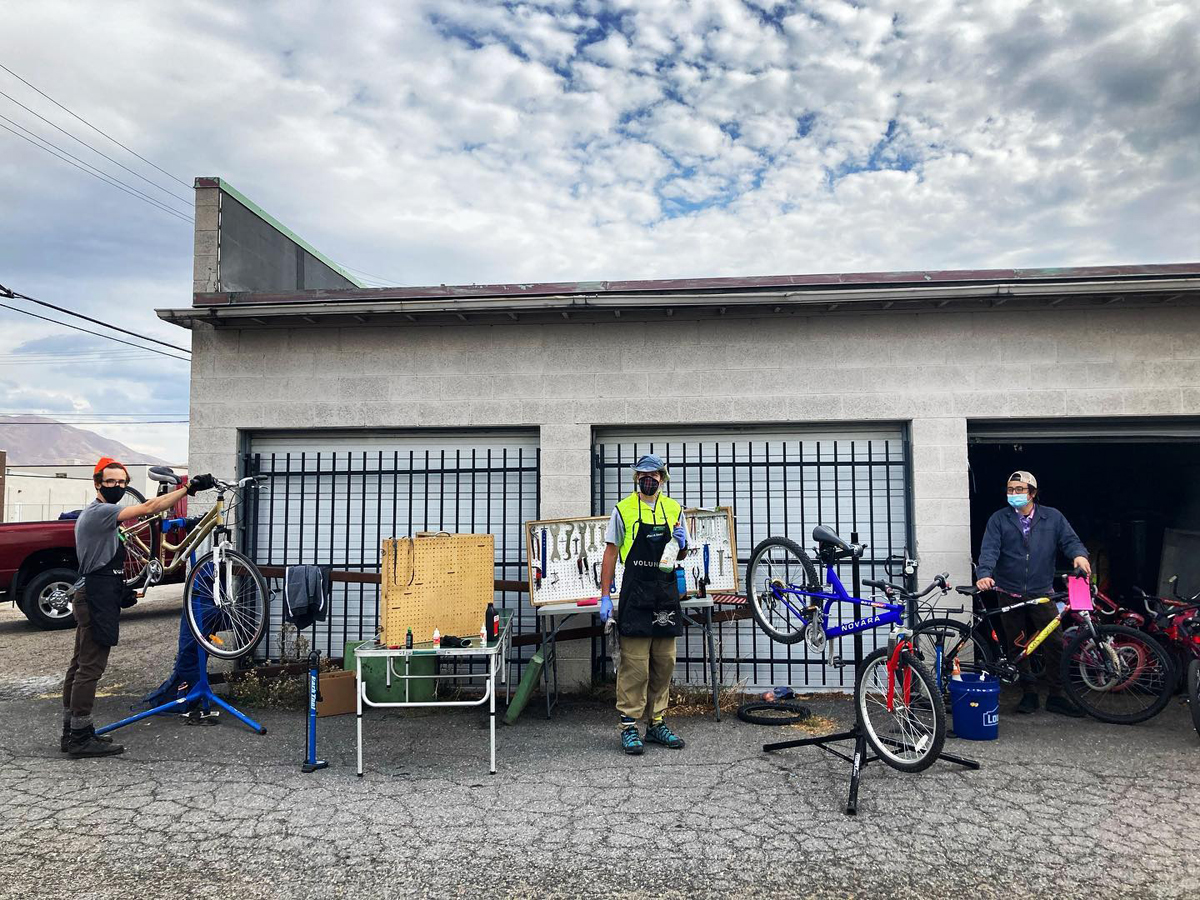
C.W.: The Collective has had to create some innovative ways to have volunteers refurbish bicycles. Can you discuss the challenges?
Essen S.: We started by having volunteers check out bicycles to work on from home or help with limited online work. This was tricky with volunteers who were accustomed to and wanted to do activities in person, or who lacked space or tools to work on bikes at home. We made tools and bike stands available to check out alongside repair bicycles. During the summer heat, it was too hot to work outdoors during the day, so once the brunt of the summer heat was through, we started working on bicycles outdoors during the mornings or the evening hours before sunset. Volunteers refurbished bicycles either at a park, in our shed, or behind the Collective! We created outdoor kits including toolboxes, stands, and parts that might be needed for the bicycles. This all took much longer to assemble and move, but kept us going in a safer way. When working under these circumstances, volunteers need to sign up for shifts, which previously was not required.
C.W.: Have the staff mechanics helped the volunteers?
Essen S.: Our shop mechanics still work on bikes we sell to help finance the shop. We set aside a day to work on bicycles during large-demand times. We recently developed a Zoom session where our head mechanic presented a class on bike repair. We hope to do more.
C.W.: What are the current needs of the Collective?
Essen S.: Bikes with 24″ wheels are always in high demand when we give bikes to pre-teens and teenagers – we always seem to go through that size quickly. Bikes that make good commuters are also very nice: ideally higher than 10 speed shifting, sturdy tires, durable. Bikes with mounts for racks/baskets are always nice for clients who’d like to add those on down the road.
We are constantly growing our partnerships with diverse organizations that serve people with high needs. We provide service vouchers for those who need a bicycle as their main transportation and cannot afford to get their bicycles fixed during the pandemic. If you have an idea for how we could collaborate for the community’s good, reach out to us!
Patrick Watson and I spent many Friday mornings together enjoying the camaraderie of repairing bicycles that would be donated to those in need.
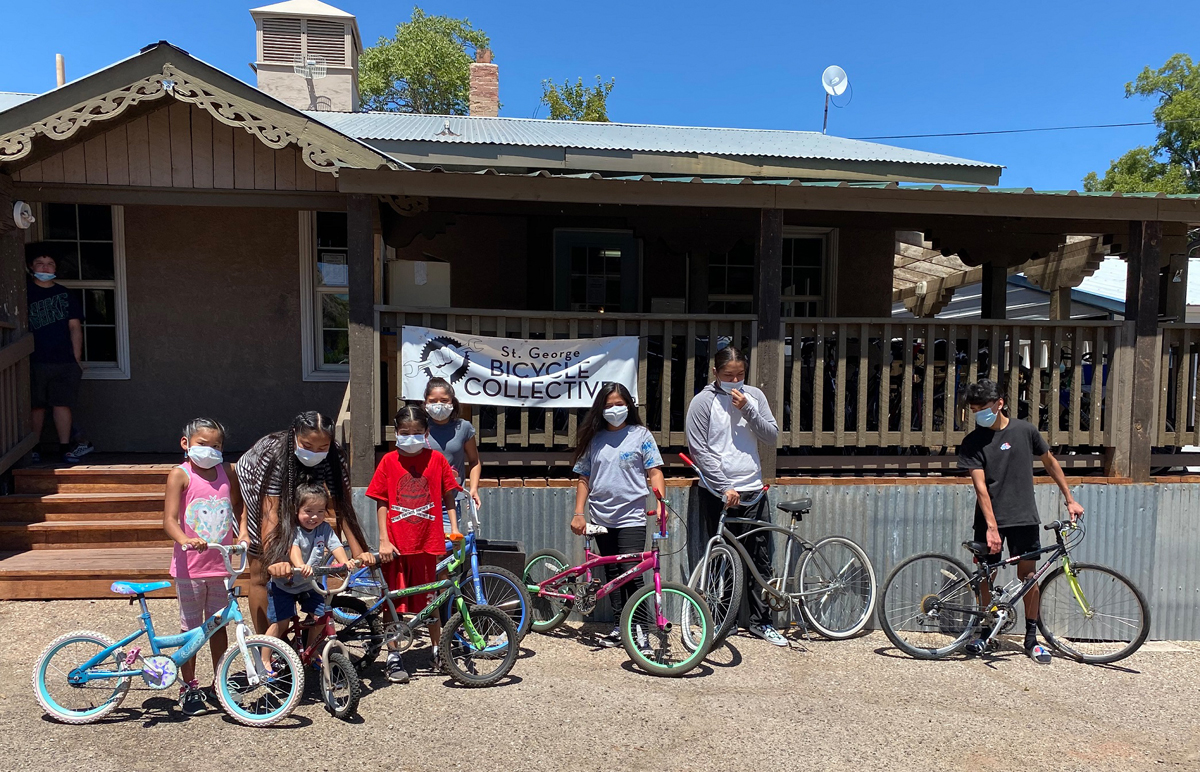
Cycling West: Patrick, How are you are helping out at the Collective?
Patrick W.: Given the current Covid environment, the Collective is allowing 3 days a week, a mixture of evenings and early morning options one can sign up to volunteer. Only one volunteer at a time is allowed at the Collective to work on bikes and only when the staff is not there. We have to answer a questionnaire about our health prior to coming into the shop in person. It is nice to have the shop’s access, but it is a bit lonely.
C.W.: What other venues have you used to help out?
Patrick W.: Other venues I have used to work on bikes have included a Collective socially distanced local park setting with other volunteers. The Collective brought bike stands, bikes to work on and tools to use. We did this during the good weather of autumn. As the weather progressed, we worked out behind the shop in front of a storage unit distancing ourselves but having access to the shop for added tools and facilities. I have also wrenched in your garage as it is well equipped and has a small heater.
C.W.: What are the problems with wrenching at home?
Patrick W.: I have tried to utilize the Collective’s generous offer to drop off bikes at my house but given my available space it was not conducive. Other challenges were having the needed tools on hand and most importantly having a sounding board to assist when questions arise about a repair question.
C.W.: What do you miss most about the impact of the coronavirus and volunteering?
Patrick W: Mostly I miss the shared tribal knowledge and interaction amongst all during our volunteer time blocks. Also seeing the aggregated work being achieved was a nice boost to solidify the benefit to the community.
_
Former Salt Lake City Bicycle Collective Volunteer and Program Coordinator, Amy Nguyen is now volunteering at the Boise Bicycle Project (BBP). Life-changing events caused her to leave Salt Lake, first spending time in Australia, followed by her relocation to Boise just as the first coronavirus cases were being diagnosed on the west coast. It took 6 months, but she is employed in addition to being a volunteer tutor at the International Rescue Committee and wrenching on kids bikes for BBP.
Cycling West: Amy, tell me about your volunteer experience at Boise Bicycle Project.
Amy N: I started volunteering for the Boise Bicycle Project in November 2020, I’m a newbie! I was following the BBP on social media to see how to get involved and I came across a call for help to prep kids bikes for their annual Holiday Kids Bike Giveaway. There was an online volunteer orientation a few days after I saw the post and I signed up for it. I wanted to volunteer for the BBP because I knew it would be a good way for me to connect with the community, meet new people, and learn more wrenching skills. There is certainly something special and unique about the environment of bike co-ops. I met the best friends and people in my life when I worked at the Salt Lake City Bicycle Collective. While I’m still in the early stages of getting to know folks at the BBP, I’m positive I’ll make awesome friends like the ones I made at the SLCBC.
C.W.: What impact did the Holiday Kids Bike have?
Amy N: I refurbished a total of 6 six bikes for the Holiday Kids Bike giveaway. It was barely a drop in a sea of the 700 bikes that were refurbished and given away at the holiday event. Though a small number on my part, I’m still happy I was able to assist! I sadly was not well enough to attend the event to witness the kids receiving bikes. From the photos I saw and given the COVID circumstances, it was a big challenge that turned into a monumental success.
C.W.: How does wrenching from home compare to your time at the Bicycle Collective?
Amy N.: I am privileged to have the space and tools needed to do bike repairs from my home. The BBP has a coordinator who sets aside bikes and parts for volunteers to pick up once a week. We can usually take the time we need to repair the bikes. I try not to spend more than a week on the bikes I take home. One of the major benefits of working on the bikes at home (other than the health safety aspect, of course) is I can work on the bikes little by little throughout the week instead of feeling the pressure to repair a bike during one specific volunteer time. My wrenching skills are ok but still require many YouTube and Google searches – bless you, Internet. I have yet to experience an in-person volunteer shift at the BBP, but if it were anything like a volunteer shift at the SLCBC, I would say volunteering in the shop with other volunteers is the best and most ideal way to engage, connect with others, and learn more about bike repair.
C.W.: How has the coronavirus impacted the programs and how has BBP adapted?
Amy N.: BBP’s mission is to promote the personal, social, and environmental benefits of bicycling. They are able to meet this mission by offering many adult and youth programs that provide bikes while empowering each individual with the knowledge to repair their own bike. They also host a slew of cycling events that enhances the community like “Goathead Fest” where volunteers come together to pull thousands of pounds of goatheads along Boise bike trails.
BBP definitely took huge measures to adapt to the challenging times of COVID. They had extra storage space in an abandoned Pizza Hut building down the street from their headquarters where they ended up gutting it out and remodeling it to have more open space to allow volunteers to work from a safe distance to one another. Volunteers still have the option to wrench from home. After attending their Annual Impact meeting this week, some goals to highlight for the BBP as they head into 2021 is to recycle 2,000 bikes back into the community, empower 2,000 individuals with bicycle repair services, and collectively ride 20,000 miles as an organization. Many great things to come and I look forward to taking part in the adventure!
[Editor’s note: Amy was recently asked to apply to the Board of Directors of BPP. ]
Lou Melini: I have been able to help by refurbishing bikes in my garage. I do miss interacting with the recipients of the bike giveaways and the smiles on their faces. However volunteering isn’t about me. The mission of the Collective is most important and despite the disruptions from the pandemic, the Bicycle Collective met its mission and gave away 1382 bikes in 2020: 358 adult and 1024 children bikes. Additionally 37 tons of metal and 3.8 tons of rubber were recycled.
If you wish to volunteer at the Bicycle Collective or partner with the Collective contact Essen: [email protected].
To find our more about Boise Bicycle Project: Boisebicycleproject.org.
For more info on Free Cycles of Missoula: http://www.freecycles.org
For information on the multitudes of bike collectives worldwide, see: https://www.bikecollectives.org


